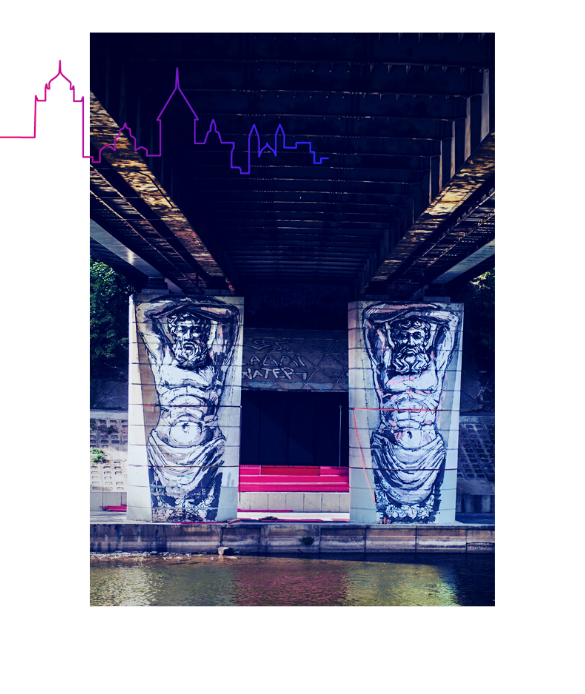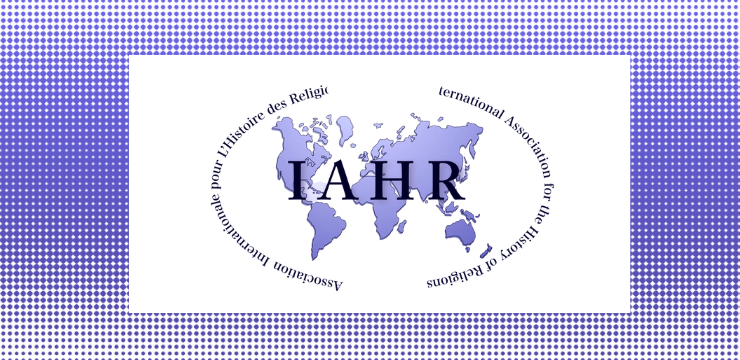



Welcome to VILNIUS!
The Lithuanian Society for the Study of Religion and Vilnius University are pleased to invite scholars interested in all aspects of religion and technology to attend the 2023 Conference of the European Association for the Study of Religions on September 4-8, 2023, in Vilnius, Lithuania.
The relationship between religion and technology is a neglected theme that needs serious research, not just concerning the past, but also in the rapidly changing modern world, where religions and religious movements have become an integral part of the digital world, influencing public opinion, and sometimes even serving as propaganda for political regimes.
Thus, we hope that the conference will contribute to the topic by bringing scholars from across Europe to Vilnius, celebrating its 700th jubilee where its founder, Grand Duke Gediminas invited scholars and scientists, ensuring religious freedom and making Vilnius a hub of religious discourse for centuries to come.
Welcome to EASR 2023!
IAHR Regional Conference
The 20th Annual Conference of the European Association for the Study of Religions is an IAHR Regional Conference.

Organizing Committee
Rasa Pranskevičiūtė-Amoson, Vilnius University - Chair
Eglė Aleknaitė, Vytautas Magnus University
Milda Ališauskienė, Vytautas Magnus University
Alfredas Buiko, Vilnius University
Kristina Garalytė, Vilnius University
Aušra Pažėraitė, Vilnius University
Tadas Snuviškis, Vilnius University
Important Dates
Call for Session Proposal (open / closed panels and roundtables):
October 1, 2022 – November 15, 2022
Notification of Acceptance of Panels:
until November 25, 2022
Call for Individual Papers
December 1, 2022 - January 31, 2023
Notification of Acceptance of Individual Papers
February 28, 2023
Registration
Early bird registration: until May 31, 2023
Standard registration: until June 30, 2023 (Deadline for presenting authors)
Late registration & on site (non presenting participants): from July 1, 2023
Final programme: July, 2023
Keynote Speakers
Jana Valtrová
Masaryk University, CzechiaTOPIC: Technologies of Cross-Cultural (Mis)Communication: Medieval Euro-Asian Encounters and “a Religion”

Jana Valtrová
Masaryk University, CzechiaJana Valtrová
 Masaryk University, Czechia
Masaryk University, CzechiaJana Valtrová
TOPIC: Technologies of Cross-Cultural (Mis)Communication: Medieval Euro-Asian Encounters and “a religion”
BIO:
Jana Valtrová is an assistant professor at the Department for the Study of Religions at Masaryk University. She holds an M.A. in History and Religious Studies, and a Ph.D. in Religious Studies, both from Masaryk University. In her research she focuses on the history of the Euro-Asian encounters, and the process of development of Western perspectives on Asian cultures and religions. The central objects of her investigation are historical travel accounts as sources reflecting the erratic process of meeting, (mis)understanding, dealing with, and interpreting the Other. Inspired by the approaches of entangled histories, in her research she deals with both the conceptual as well as practical aspects of the Euro-Asian encounters.
She is the author of a monograph Středověká setkání s ‘jinými’. Modloslužebníci, židé, saracéni a heretici v misionářských zprávách o Asii, Praha: Argo 2011 [Medieval Encounters with the Other. Idolaters, Jews, Saracens and Heretics in Missionary Reports About Asia]. She has published in number of journals including Numen: International Review for the History of Religions, Studi e Materiali di Storia delle Religioni, Religio: Revue pro religionistiku, Eurasian Studies or Journal of Religion in Europe. As a visiting scholar she delivered lectures or courses at universities in Bern, Lausanne, Leipzig, Kaunas, Krakow and Vienna.
Selected latest key publications relevant to the conference theme:
VALTROVÁ, Jana. "Struggling with Fear? Emotions in Medieval Travel Accounts about the Mongols", in: Martin Bauer - Philip Booth - Susanna Fischer (eds.), To Jerusalem and Beyond Interdisciplinary Approaches to the Study of Latin Travel Literature, c.1200-1500, Heidelberg: Heidelberg University Publishing 2023, pp. 93-116. Open acess here: https://heiup.uni-heidelberg.de/catalog/book/998/c15843
VALTROVÁ, Jana. "Christian Material Culture and the Mongols : the Case of William of Rubruck", Eurasian Studies 2020, 17/2, pp. 228-243.
VALTROVÁ, Jana. "Travels of Christian Friars to the Mongols : Social Setting and Mission in the 13th century", Mongolica Pragensia 2017, 10/1, pp. 17-36.
VALTROVÁ, Jana. "´Religion´ in Medieval Missionary Accounts about Asia", Studi e Materiali di Storia delle Religioni 2016, 82/2, pp. 571-592.
VALTROVÁ, Jana. Středověká setkání s "jinými". Modloslužebníci, židé, saracéni a heretici v misionářských zprávách o Asii (Medieval Encounters with the Other. Idolatres, Jews, Saracens and Heretics in Missionary Reports about Asia). Praha: Argo, 2011.
VALTROVÁ, Jana. "Beyond the Horizons of Legends. Traditional Imagery and Direct Experience in Medieval Accounts of Asia", Numen : international review for the history of religions 2010, 57/2, pp. 154-185.
ABSTRACT
This talk considers the effects of cross-cultural (mis)communication upon an emerging idea of “a religion” within the context of medieval Euro-Asian exchange.
Medieval contacts between European and Asian cultures intensified during the 13th and 14th centuries in reaction to the establishment and growth of the Mongol empire. Besides the military confrontations, a diplomatic and merchant exchange flourished, which was followed by religious missions of the newly established Franciscan and Dominican orders. The accounts and letters of these friars represent valuable sources because they not only provide images of a “religion of Others”, but also reflect the often-complicated process of its manufacturing. The task to promote mendicant visions of Christianity was challenged by the different natural, social, and cultural conditions to which the friars had to respond and in which their implicit concept of a “religion” did not always work. The combination of mendicant and indigenous sources enables us to unveil the mutual (mis)communication and misunderstandings between the friars and their audiences, on both the practical and the conceptual level.
In this talk, I will explore the effects of various communication technologies – such as gift exchange, interactions over food, and visual and audial representation of the friars – as well as mental concepts which were used by the mendicants to grasp and construct the “religions of Others”.
François Gauthier
University of Fribourg, SwitzerlandTOPIC: Blowing it up at Burning Man. Religion, Technology and Ritual in the Age of Authenticity

François Gauthier
University of Fribourg, SwitzerlandFrançois Gauthier
 University of Fribourg, Switzerland
University of Fribourg, SwitzerlandFrançois Gauthier
TOPIC: Blowing it up at Burning Man. Religion, Technology and Ritual in the Age of Authenticity
BIO:
François Gauthier is professor of Religious Studies at the Department of Social sciences of the Université de Fribourg, Switzerland, since 2013. Born on the Quebec side of the Ottawa river in 1973, he is a socio-anthropologist of religion who likes to think outside the box and outside the West, mixing up French and English-language traditions. He likes getting dirty when doing his ethnography and then upswinging into big macro questions and back. He prefers epistemology to fixed methods, believes Marcel Mauss was right when he refused to separate anthropology and sociology, and struggles with parenting-work equilibria.
He has recently published Religion, Modernity, Globalisation. Nation-State to Market (Routledge 2020) and has co-edited the Routledge International Handbook of Religion in Global Society (2021). He is also the co-founder and co-editor-in-chief of the generalist social scientific journal MAUSS International. Anti-Utilitarian Interventions in the Social Sciences, and a co-editor of the French language Revue du MAUSS semestrielle. He is committed to enabling the provincialisation of the West while resisting the dissolution of universalism into relativism, promotes critical thinking as a means for political involvement, and works to renew interest for religion as a main theme for the general social sciences while de-marginalising the social scientific study of religion. Finally, he is a sucker for Durkheimian effervescence and crazy stuff.
Selected latest key publications relevant to the conference theme:
GAUTHIER, François and Katri Ratia (eds.) (forthcoming) Routledge International Handbook on Ritual Creativity. London and New York: Routledge.
Cornelio, Jayeel, François GAUTHIER, Tuomas Martikainen and Linda Woodhead (eds.), 2021, Routledge International Handbook on Religion in Global Society. London and New York: Routledge, 522p.
GAUTHIER, François and Tuomas Martikainen (eds.) (2020) The Marketization of Religion. London and New York: Routledge.
GAUTHIER, François, 2020, Religion, Modernity, Globalisation. Nation-State to Market. London and New York: Routledge.
GAUTHIER, François, 2021, ‘Why All These ‘Neos’? Why Now? The Structural Conditions Of “New Age Spiritualities” In The Global-Market Era, As Seen From Latin America’, Ciencias Sociales Y Religión/Ciências Sociais E Religião 23: 43p. Special issue edited by Renée de la Torre, Cristina Gutiérrez Zúñiga and Yael Dansac: ‘Neopaganismo, Neoindianismo y New Age: creaciones rituales, desafíos patrimoniales y usos identitarios de los sitios arqueológicos’. Online: https://doi.org/10.20396/csr.v23i00.15077
GAUTHIER, François, 2021, ‘Authenticity, Consumer Culture and Charismatic Authority’, Studies in Religion/Sciences religieuses (SR) 50(1): 27-49. https://doi.org/10.1177/0008429820920885
GAUTHIER, François, 2018, « “Our Play Pleases the Man, the Spirits of the Desert, and Whatever.” Enjoying Religion at Burning Man », in Frans Jespers, Karin van Nieuwkerk and Paul van der Velde (eds.), Enjoying Religion. London: Lexington, pp.103-126.
ABSTRACT
Burning Man is one of the West’s most important event-culture, which assembles over 70’000 participants in Nevada’s Black Rock Desert for the duration of a week, and which has fostered related progeny worldwide. Shunning all definitions and attributes, BM’s gift-based economy is a bonanza of intense experiences that oscillate between transgressive and carnivalesque effervescence and intense personal experiences of interiority. Framed by the “Ten Principles”, BM is fueled by a truly ingenious and effective mix of technologies inherited from the counter-cultural tradition or invented in situ. Peopled in majority by “spiritual-not-religious” actors (but not only), BM is by no means an explicitly religious event, yet the religious dimensions are overwhelming. At the same time, BM is wholly unassimilable within the usual epistemologies of the sociology of religion and religious studies. How are we, then, to understand BM? The first part of this presentation will attempt to describe the event and pin down some general traits of its dynamics and structure. The second part raises the question of how we are to deal with BM in the study of religion? I argue that a pretty radically different perspective is needed, one that does not start by defining religion as a differentiated sphere but rather, in the wake of Marcel Mauss, one that understands religion to be fundamental and irreducible dimension of social phenomena considered as total social facts. From this angle, BM suddenly appears not as a marginal phenomenon with respect to “real religion”, but rather as a formidable example of and even standard for religion in our globalized, consumer societies.
Xenia Zeiler
University of Helsinki, FinlandTOPIC: Novel Fields and Technological Spaces in Digital Religion Research: Digital Hinduism and Video Games

Xenia Zeiler
University of Helsinki, FinlandXenia Zeiler
 University of Helsinki, Finland
University of Helsinki, Finland Xenia Zeiler
TOPIC: Novel Fields and Technological Spaces in Digital Religion Research: Digital Hinduism and Video Games
BIO:
Xenia Zeiler is Professor of South Asian Studies at the University of Helsinki, Finland. Her research and teaching are situated at the intersection of digital media, culture and society, especially as related to India and global Indian communities. Her research foci are video games and gaming in India and beyond, digital religion (especially digital Hinduism) and global Hinduism. She also researches and teaches aspects of mediatized and digital cultural heritage and popular culture, especially as related to India.
Selected latest key publications relevant to the conference theme:
Grieve, G. P., Radde-Antweiler, K. and Zeiler, X. (in press) 2022. Value Formations. In: Campbell, H. and Cheong, P. H. (eds.), The Oxford Handbook of Digital Religion. Oxford University Press.
Zeiler, X. and Mukherjee, S. 2022. Video Game Development in India: A Cultural and Creative Industry Embracing Regional Cultural Heritage(s). In: Games and Culture 17(4), 509-527.
Zeiler, X. and Thomas, S. (eds.) 2021. Video Games and Cultural Heritage. Special Issue, International Journal of Heritage Studies, T&F.
Zeiler, X. (ed.) 2020. Digital Hinduism. London and New York: Routledge.
Radde-Antweiler, K. and Zeiler, X. (eds.) 2020. The Routledge Handbook of Religion and Journalism. London and New York: Routledge.
Radde-Antweiler, K. and Zeiler, X. (eds.) 2019. Mediatized Religion in Asia. Studies on Digital Media and Religion. London and New York: Routledge.
Šisler, V., Radde-Antweiler, K. and Zeiler, X. (eds.) 2018. Methods for Studying Video Games and Religion. London and New York: Routledge (Routledge Studies in Religion and Digital Culture).
ABSTRACT
Digital religion, as a field of inquiry and as an academic discipline, has been around for more than twenty years now. Not surprisingly, and especially due to the growing acceptance and intensifying interest in the study of religion and digital media, the field has diversified over time. The expanding scope and shape of studies on digital religion increasingly include new research fields, technological genres and spaces, themes, questions, and adequate new approaches, methods, and theoretical frames. This keynote looks into two distinct examples for this.
It opens with presenting central themes, approaches, and perspectives in the still novel subfield of digital religion research, digital Hinduism. By today, Hindu actors (individuals, groups or institutions) vastly interact with digital spaces and as a consequence (re)negotiate and (re)construct contemporary Hindu beliefs and practices. The used technology is wide-ranging and includes but is not limited to social media such as Facebook, WhatsApp, Twitter and Instagram, online streaming such as Live Darshan, and video games. The keynote’s second part then focuses on the latter, on video games and gaming as an increasingly important media genre and space for digital religion research. Illustrated with examples from Indian video games it especially discusses the potential of applying novel approaches and lenses – such as the analytical concept of value formations and the broader lens of cultural heritage – to discover, describe and study underlying or implicit religious topics in video games.
Neil Price
Uppsala University, SwedenTOPIC: Memory Machines: Material Frontiers of Religion, Conversion, and Violence in Viking-Age Scandinavia

Neil Price
Uppsala University, SwedenNeil Price
 Uppsala University, Sweden
Uppsala University, SwedenNeil Price
TOPIC: Memory Machines: Material Frontiers of Religion, Conversion, and Violence in Viking-Age Scandinavia
BIO:
Neil Price is Distinguished Professor of Archaeology at Uppsala University, Sweden. A leading expert on the Viking Age, his fieldwork, teaching, and research has taken him to more than 40 countries. His publications have appeared in 20 languages, and he is a frequent consultant and contributor to television and film.
Selected latest key publications relevant to the conference theme:
Price, N. 2020. Children of Ash and Elm: a History of the Vikings. Basic Books, New York / Allen Lane, London.
Price, N. 2020. Death ritual and mortuary behaviour. In Andrén, A., Schjødt, J-P. and Lindow, J. (eds) The Pre-Christian Religions of the North: Histories and Structures. Vol. II. Brepols, Turnhout: 853-896.
Price, N. 2019. The Viking Way: Magic and Mind in Late Iron Age Scandinavia. Oxbow Books, Oxford
Price, N. 2010. Passing into poetry: Viking-Age mortuary drama and the origins of Norse mythology. Medieval Archaeology 54: 123-156.
ABSTRACT
The so-called Viking Age of Scandinavia, c. 750-1050 CE, saw some of the most profound social and political transformations in European history: a shift from small, regional polities to unified nation states, and the gradual replacement of complex, polytheistic Northern beliefs with the doctrines of Christianity. Two factors were central to this process, namely the active use of material culture, and the deep-seated role that war played in world-views of the Norse. This talk will explore the media for these messages, through the archaeology of burial in the Viking Age. Mortuary behaviour was a technological mechanism, and the resulting funerary monuments were effectively machines for the perpetuation of memory. We will encounter the war sorcerers of the Vikings, the ‘weapon graves’ of the social and military elites, and consider the gendered construction of warriorhood against the background of religious change. The Christians also activated material culture in their mission of conversion, coupled with the acquisition of political power. Using the increasingly popular medium of runic memorials, they articulated new concepts of the ‘good’ person, contrasting sharply with the valorisation of aggression promoted by the old beliefs. As they crossed these frontiers of religion, technology, and war, the diverse peoples of Scandinavia navigated an altered, different world.

Bronislaw Szerszynski
Lancaster University, UKBronislaw Szerszynski
 Lancaster University, UK
Lancaster University, UKBronislaw Szerszynski
TOPIC: The Twilight of the Machines: Technology Before and After Monotheism
BIO:
Bronislaw Szerszynski is Professor of Sociology at Lancaster University. His research seeks to situate social life in the longer perspective of human and planetary history, drawing on the social and natural sciences, arts and humanities. He is co-author with Nigel Clark of Planetary Social Thought (2021), author of Nature, Technology and the Sacred (2005), and co-editor of Risk, Environment and Modernity (1996), Re-Ordering Nature: Theology, Society and the New Genetics (2003), Nature Performed: Environment, Culture and Performance (2003) and Technofutures: Transdisciplinary Perspectives on Nature and the Sacred (2015). As well as academic publications, his outputs also include performances, creative writing, art-science exhibitions and events, and experimental participatory workshops. He was co-organiser of the public art–science events Between Nature: Explorations in Ecology and Performance (Lancaster, 2000), Experimentality (Lancaster/Manchester/London, 2009-10), and Anthropocene Monument, with Bruno Latour and Olivier Michelon (Toulouse, 2014-2015).
Selected latest key publications relevant to the conference theme:
Clark, N. and Szerszynski, B. (2022) ‘Rifted subjects, fractured Earth: “progress” as learning to live on a self-transforming planet’, Sociological Review 70(2): 385–401. https://doi.org/10.1177/00380261221084783
Szerszynski, B. (2018) ‘Monument Antropocenu, czyli o splocie czasu geologicznego z ludzkim’, Prace Kulturoznawcze, 22(1-2): 281-305. [Translation into Polish of ‘The Anthropocene monument’] https://doi.org/10.19195/0860-6668.22.1-2.19
Szerszynski, B. (2017) ‘Viewing the technosphere in an interplanetary light’, The Anthropocene Review, 4(2): 92–102. http://doi.org/1177/2053019616670676
Szerszynski, B. (2017) ‘Gods of the Anthropocene: geo-spiritual formations in the Earth’s new epoch’, Theory, Culture & Society, 34(2–3): 253–275. http://doi.org/10.1177/0263276417691102
Szerszynski, B. (2017) ‘The Anthropocene monument: on relating geological and human time’, European Journal of Social Theory, 20(1): 111–131. http://doi.org/10.1177/1368431016666087
Szerszynski, B. (2016) ‘Praise be to you, earth-beings’, Environmental Humanities, 8(2): 291–7. http://doi.org/10.1215/22011919-3664414
Szerszynski, B. (2012) ‘The end of the end of nature: the Anthropocene and the fate of the human’, Oxford Literary Review, 34(2): 165-84. http://doi.org/10.3366/olr.2012.0040
Szerszynski, B. (2010) ‘Technology and monotheism: a dialogue with neo-Calvinist philosophy’, Philosophia Reformata, 75: 43–59. http://doi.org/10.1163/22116117-90000481
More publications and books: PRESS HERE
ABSTRACT
In this performance for spoken voice, music and animation, I present the story of humanity’s changing relation with technology in mythological form, as if told in the distant future by an unknown being. We hear how, partly due to the influence of monotheism in the West, an originary cosmotechnics organised around craft and ritual was replaced by a modern understanding of technology that combined ‘magic’ and ‘religion’: that promised to bring about specific goals in ways that affirm the regular, lawful character of the cosmos. The hope embedded in modern technology was that, just as angels extended God’s will through the cosmos, machines would be the wholly subordinated ‘extensions of man’. However, modern technologies refuse to be contained within this cosmotechnical regime, generating various kinds of ‘techno-demonic’ phenomena that escape the human will. This story of the destiny or twilight of the machines ends on an ambiguous note. Does machine-being have its own nature, its own destiny, that ultimately has no place for human beings? And what might an alternative cosmotechnical condition for humanity look like, one beyond monotheism and beyond machines? (Words and music by Bronislaw Szerszynski, animations by Adam York Gregory.)

Conference Venue
The Annual Conference of EASR will take place in Radisson Blu Hotel Lietuva, located on Konstitucijos av. 20, Vilnius, Lithuania




















